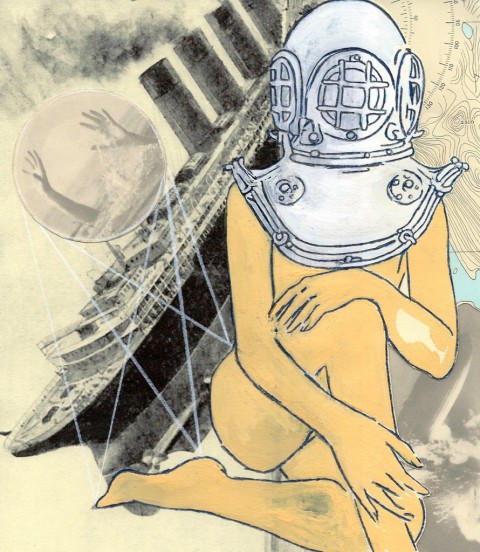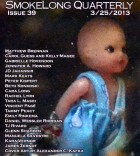I. This is what she does. She goes looking for destruction. She steals a Sunday paper and she looks for a handgun in the classifieds and after a few minutes she comes across a personal ad.
I want to be someone’s disaster, he writes. Someone’s Lusitania, someone’s Chernobyl. Send to P.O. Box 114, Springfield, Illinois, to apply.
She sits down and writes the letter that afternoon. Her hand shakes and “Illinois” comes out looking like a cardiogram, a seismograph reading. She deserves this, she knows. She is more deserving of this than anyone.
II. I am a modest man, his first letter reads. I have reasonable aims. Let me share destruction with you.
Enclosed in the envelope is a sepia-tone photograph of a Model T Ford gone nose-down in a ditch, steam pouring from its hood and its metal bending in impossible angles. In the photograph, the faces of the onlookers are too blurred to interpret.
He signs the letter Sincerely, Your Hindenburg.
It is around this time that she remembers she never bought a handgun. She goes to the liquor store and buys a bottle of bourbon and instead sets about stripping her insides of lacquer. The burn lets her know she is doing something right. Later, when she has consumed several more ounces of paintstripping epiphany, she thinks about the secret of parenting, which is not really a secret at all, which is that nothing you ever do is enough or can be enough or will be enough, and yet for some parents this “not enough” means their child becomes a biology teacher instead of a neurosurgeon while for others “not enough” is buried in a three-foot coffin in the Catholic cemetery in Cleveland, Ohio.
III. The next letter contains another old photograph, this one of Mount Saint Helens the day after it erupted.
You think you will find something in ruin, he writes. You have not even begun to comprehend ruin.
She knows from doing research that pneumonia and diarrhea are the most common causes of childhood mortality worldwide, although accidents remain the leading cause in her country. She wonders how it feels to have your children die slowly, to watch them choke for breath or lose their insides over a ditch in the dirt. She wonders how anyone can wash the sounds of windshield glass shattering and tiny bones grating on pavement from the walls of their minds.
On the back of a picture of a black hole: you can become your own event horizon.
IV. She keeps the photographs in an old recipe box when they arrive: a demolished building, a half-submerged ocean tanker, a factory fire, a derailed train. Each one is accompanied by a tidy handwritten caption.
Dresden.
Pompeii.
The Space Shuttle Challenger.
Do you want to be told you are making things better? he writes. Nothing ever makes things better.
The next photograph he sends is a diptych, the first frame portraying a priceless Ming vase and the second containing the same vase shattered in pieces on the floor.
Just to see how they will react, or perhaps because she has run out of conversation, she tells her friends she is collecting disasters. She likens it to collecting stamps or rocks or rare coins. I’ll trade you, she tells them. A kitchen fire for a calving glacier. A derailed train for Wallachia, circa 1450.
She suspects that if she collects enough of them, the disasters will act as a glue to bind and suture the awful jagged shards inside her chest.
V. The letters come several at a time now. Her recipe box begins to overflow, stuffed full with a thousand catastrophes captured in celluloid.
Forest fires. Concentration camps. A famous painting slashed from its frame, a canary lying dead in its cage. Two bare, frozen ankles protruding from a snowbank. A mother weeping in the street, her face upturned, her child blown to bits before her eyes.
Then one day the letters stop coming. The mailbox sits empty; the Postal Service confirms that their carriers have received nothing new.
She doesn’t know what to do. For the first time, she thinks she understands the concept of shipwreck. She buys more bottles and when they are empty considers breaking them over her arm so she can feel something different. Sinkholes open in her chest; she feels Hiroshima in every heartbeat. She thumbs through her recipe box until the photographs are smudged with fingerprints, but the disasters remind her of only one thing:
Accidents.
Accidents.
Accidents.
A few weeks later, she receives a letter addressed in a different hand. The envelope contains a photograph of a pair of boots dangling in empty space, the legs extending gracefully upwards out of the frame and into some silent version of eternity.
Also contained in the envelope is a final note bearing a crooked signature. She looks at the loops and spikes of his name for a long time, absorbing the slow knowledge that there are certain supplications that will not be answered, that are their own worst disasters, their own ruin.
I’m sorry, he wrote, the handwriting swaying as if in a breeze. I’m sorry, but you were not enough.



 The core workshop of SmokeLong Fitness is all in writing, so you can take part from anywhere at anytime. We are excited about creating a supportive, consistent and structured environment for flash writers to work on their craft in a community. We are thrilled and proud to say that our workshop participants have won, placed, or been listed in every major flash competition. Community works.
The core workshop of SmokeLong Fitness is all in writing, so you can take part from anywhere at anytime. We are excited about creating a supportive, consistent and structured environment for flash writers to work on their craft in a community. We are thrilled and proud to say that our workshop participants have won, placed, or been listed in every major flash competition. Community works.